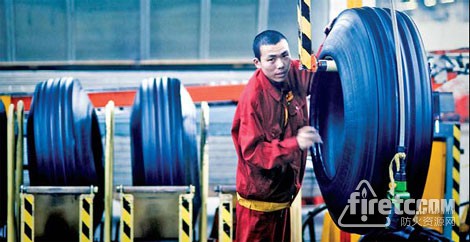
A factory worker produces tires in Jining, Shandong province. Tariffs on Chinese tire imports did little to create jobs for the US, but instead shifted production to other countries.[Photo / Bloomberg]
BEIJING - Tariffs on Chinese tire imports levied over the past two years by the United States have seriously harmed Chinese producers, and the World Trade Organization (WTO) ruling on Sept 5 will intensify their difficulties, experts said.
The WTO rejected a Chinese complaint against punitive US tariffs on Chinese tire imports. The case arose out of a decision by US President Barack Obama in September 2009 to impose 35 percent additional duties on Chinese tire imports.
The Ministry of Commerce on Sept 6 expressed its regret over the WTO ruling and urged the US to create a fair competition environment for Chinese companies.
"The measures taken by the United States in 2009 ... are protectionist measures" taken in response to domestic political pressure, an unidentified official said in a statement posted on the ministry's website.
The official said the tariffs, which didn't gain support from the US industry, hurt China's legitimate trading interests and didn't help reduce US tire imports.
Although US imports of Chinese tires declined by about 24 percent in 2010 and 6 percent in the first half of 2011, US tire imports still grew 20 percent in 2010 and 9 percent in the first half, according to the ministry.
US Trade Representative Ron Kirk said in a statement that the WTO ruling is a "tremendous victory for the US as well as for American workers and manufacturers".
"Actually, different groups in the United States have adopted different attitudes toward trade protectionism," said Yan Wei, chief economist of Orient Securities Co Ltd.
"The workers union firmly supports the tariffs, while the manufacturers show an ambiguous or opposing attitude as they have manufacturing bases in China and import from China," he said.
The tariffs did little to create jobs for the US but largely shifted the import source from China to countries such as Brazil and Mexico, Yan said.
Cai Weimin, general-secretary of the tire branch of the China Rubber Industry Association, said even though the US tariff rate is falling to 25 percent from 35 percent, the effect on Chinese producers continues.
Although Chinese tire companies did a good job in exploring overseas markets in the past two years, the outlook for the industry is not positive, he said.
Risks remain in the coming months due to weak demand in the US and European markets, according to the Rubber Industry Association.



